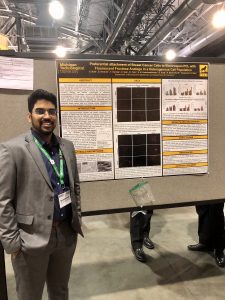Dear Colleagues,
As you have heard from the President Koubek, the health, safety, and security of our campus and our community is most important to us. We need to make substantial changes in how we go about our daily lives in response to the evolving COVID-19 threat. This is a rapidly changing situation so we will, no doubt, need to continuously adjust our responses as we learn more. For comprehensive and up-to-date information please see the University’s COVID-19 web page.
In response to the evolving COVID-19 situation, the Graduate School is committed to doing all we can to make the rest of the semester as healthy and productive as possible. Here are some issues the Graduate School is asking faculty to consider.
I. Research progress
Per the President’s memo, all instruction at Michigan Tech must be delivered virtually till 17 April 2020. I am sure you are wondering how this will impact progress in your research group. How should ongoing research involving graduate students be handled? This will undoubtedly vary with research group and depend on the nature of research, the need for physical presence in the laboratory, and the individual group members comfort, attitude and tolerance in this rapidly evolving situation. The Vice President for Research’s Office will be posting guidelines to help clarify general expectations soon. Please see the email from Kathleen Halverson, VPR, for additional information regarding research labs.
The University campus is not closed. Students, faculty, and staff can be on campus, and people can interact in small groups (less than 25). Under those guidelines, research and interactions among advisors, students, and staff may continue.
However, appropriate precautions should be taken and the option to continue research and research-related meetings remotely must be accommodated. In particular, remote attendance (e.g. via Zoom or Google Hangout) for group meetings among students, advisors, and staff is strongly advised. For research requiring physical presence in a laboratory, lab schedules and social distancing practices should minimize interpersonal exposure.
Please communicate with your graduate students about how you plan to organize your research group, no later than March 18. Clearly communicate your expectations and timelines with your students. Be creative with regards to how to accomplish research work, meetings, writing projects and other activities so that students make research progress in a positive educational experience.
If you have students returning from travel, please follow the university guidelines University guidelines and ask anyone who has traveled in the past 14 days to fill out the University’s Returning Travelers form. Social-distancing, self-isolation, and self-monitoring are the best ways to contain the spread of COVID-19 (Sections IV and V).
II. Defenses, research proposal examinations, and qualifying examinations
Spring (and especially mid to late spring) is a time when many graduate students schedule dissertation/thesis/report defenses, research proposal examinations and qualifying examinations. These milestones typically include a public presentation followed by an in-depth examination by the advisory committee members. Commensurate with the current policy of virtual instruction until April 17, all oral examinations and defenses must be conducted virtually (for example, via Zoom) to allow all interested to participate. Please make arrangements well in advance to accommodate this need. The student should contact IT (it-help@mtu.edu, 906-487-1111) for assistance at least 5 business days in advance to appropriately schedule staffing and potential equipment usage. The in-depth examination with some or all of the advisory committee members can be conducted face-to-face if it is agreeable to those participating.
Michigan Technological University IT Department offers Zoom (log in with Michigan Tech ID and password) for Web conferencing support. Zoom will allow you to share your screen, webcam and microphone with up to 100 participants. The IT Knowledge Base on Conferencing includes helpful information on web conferencing options and support.
III. Graduate School Emergency Fund
Funds from the Graduate School Emergency Fund is available to assist graduate students with emergencies and financial hardships.
Stay healthy and follow the guidance from the university and CDC. If you have questions or concerns, please do not hesitate to email me or Will Cantrell (cantrell@mtu.edu) or Jacque Smith (jacque@mtui.edu). The Graduate School and the University will do our best to keep you apprised as new developments occur at University’s COVID-19 web page.
With best wishes,
Dean Pushpa Murthy
Associate Provost and Dean of the Graduate School
Michigan Technological University
Houghton, MI-49931
—
This email account is monitored by staff in the Graduate School. Please reply to this email with any questions you have.
Michigan Tech Graduate School
gradschool@mtu.edu
906-487-2327 (voice)
906-487-2284 (fax)
Resources for current students:
http://www.mtu.edu/gradschool/resources-for/students/




